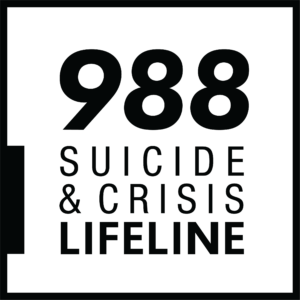Surviving the suicide of a loved one is a life-changing ordeal that requires all of the resilience that a survivor can muster, and all of the support that family and community can provide. In this blog, we hope to highlight some themes in the grief of suicide loss survivors, with the aim of helping you to understand your own complicated grief — or to empower you to help support a friend, family member, colleague, or client who is grieving a suicide loss.
What are some thoughts and feelings common to suicide loss survivors?
With a death by suicide, many grieving people have questions and complex emotions. Each of the emotions described below are normal and understandable reactions to surviving a death by suicide.
- Asking “why?” – Often, suicide loss survivors try desperately to understand how their loved one could have felt like suicide was the only option. This might look like replaying events leading up to the death and analyzing what could have been done or said differently to “save” their loved one. This question is often what most differentiates grief of a suicide death from other losses.
- Responsibility – At first, the suicide of a loved one may have come as a shock: they did not give any indication that they were thinking of taking their own life, they did not seem depressed, the signs did not seem to be there. However, looking back, some survivors may experience the “tyranny of hindsight” – feeling that the signs now seem obvious. Suicide loss survivors may blame themselves or others for not knowing what was going to happen which can lead to feelings of guilt and anger. Although these feelings are common, a death by suicide is the result of many complex factors and never the result of one person or event.
- Social disruption and isolation – Other people in the community who hear about a suicide may retreat from discussing the subject out of discomfort or insecurity about an appropriate reaction, which may result in isolation or long-term changed relationships for the survivor. Alternatively, survivors may isolate themselves when they feel like people who have not experienced this type of loss cannot possibly understand what they are going through.
- Shame – While it is improving, there is still stigma surrounding suicide and mental illness. Suicide loss survivors may feel judged by others, as well as themselves, for not preventing the death. This feeling of being judged can escalate feelings of guilt and isolation.
- Anger – Suicide loss survivors may feel anger at themselves, at the person who died, or at family members or friends. Sometimes born from feelings of rejection and abandonment, anger can be exacerbated by secondary losses, such as the loss of a home, relationships, or financial security.
- Trauma – Shock and horror in the form of trauma can bring up many related feelings. Even for those who did not find the body of the lost loved one, Post-Traumatic Stress Disorder (PTSD) is not uncommon. Survivors may also be hypervigilant, wondering if they may miss signs of suicidality in someone else or in themselves.
- Relief – Survivors may also feel relief after their loved one’s death. If their loved one had been struggling with chronic physical or mental illness, their death may have brought the end of suffering. For some, the relationship may have been complicated, where the person who died was perhaps hurtful, threatening, or cruel. Relief may be the result of a feeling of resolution and an end to uncertainty.
- Suicidality – Suicide loss survivors are at a heightened risk for hopelessness or suicidality. Not always as obvious, these feelings can be passive (e.g., “I just want to be with him”), especially as survivors feel a loss of their identity or role status (e.g., parent, spouse, caretaker). While suicidal feelings in those grieving a loss to suicide are not uncommon, especially early on, particular attention should be paid if loss survivors find their thoughts shift from passive suicidality (e.g. “I wish I wouldn’t wake up tomorrow”) to active suicidality.
What are some common myths about grief?
- “Grief happens in stages.” It is a detrimental misconception that grief happens in stages – that a grieving person should move through a certain set of emotions to move toward “healing.” Grief is not linear, or something that goes away permanently after a certain period, and not all loss survivors will experience grief in the same way. There may be extended stretches when a survivor feels that they have their grief managed. When it reappears, it may make a survivor feel as though they have made no progress at all. This is not true. Grief can be repetitive. The goal is for the intensity, frequency, and duration of these feelings to lessen over time.
- “Time heals everything.” Grief needs time to heal, but time does not heal grief. Survivors cannot just wait it out and hope it will get better. Doing the work to process grief is essential.
- “Everyone grieves the same.” Grief is not one size fits all. Everyone’s plan and journey moving through their grief is very individual.
What can help survivors?
Post-traumatic growth is possible for survivors who build a support system as they travel through their grief. These supports can include:
- Access to effective mental and physical health care
- Strong connections with friends, partners, family, and community
- Optimism and focus on reasons for living
- Sobriety and/or impulse control
- Self-worth/esteem and a sense of personal control
- Healthy coping skills, such as problem-solving and resiliency
- A reasonably safe and stable environment, including restricted access to lethal means
- Responsibilities and duties to others, such as family, friends, and pets
What can growth look like after a loss to suicide?
A loss to suicide is not something to “get over,” but loss survivors can learn to carry it and eventually have their grief be less intrusive. Emotional fortitude can come in a number of different ways:
- Perspective – The loss of a loved one to suicide may give survivors a new perspective of the world and the human experience. This perspective shift will likely come with a stronger sense of empathy and awareness of others’ emotions.
- Appreciation – With the experience and knowledge that things can change in an instant, survivors may begin to appreciate people and aspects in their lives more fully than they ever had. Eventually, this may also include a greater focus on appreciating time spent with their loved one than the time they’ve lost.
- Purpose – Many survivors find an inspiration to help others after their loss. This may mean making major life changes as they dedicate time and resources towards new priorities.
- Hope – By surrounding themselves with other survivors, many who have lost a loved one to suicide can start to feel a renewed sense of hope that they can survive this loss and find a new normal that includes happy times again.









